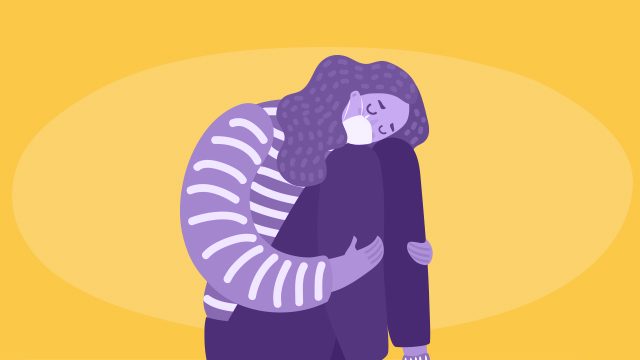SUMMARY
This is AI generated summarization, which may have errors. For context, always refer to the full article.

MANILA, Philippines – Although the statistics may make it seem like the chances of being infected with a severe case of COVID-19 is small, the fact remains that these instances do occur.
When a person is afflicted with a severe case of COVID-19, how this person’s family copes would be vastly different from how a family of one with a mild to moderate case would.
In a situation marked by a potential fatality, it is only natural for feelings associated with fear, ambiguity, and anticipatory grief come in. For some, their reaction to these feelings can be diverse – from ignoring them altogether, curling up into a ball, getting stuck, to feeling dazed, among others.
In this article, I’ll be talking about how we can adaptively cope in situations like these.
WHEN A CASE IS SEVERE
When a person’s case of COVID-19 is severe, as with mild to moderate cases, anxiety and fear are most likely the initial reactions amongst a person’s loved ones. Ways to cope with these have been discussed in my previous article. However, greater feelings that stem from uncertainty and anticipatory grief (experiencing grief or bereavement before an impending loss) are distinct reactions that come from the possibility of death.
I am not saying, in any way, that every severe case of COVID-19 will result in a fatality. Still, ambiguity and the fear of losing a loved one is a weight many will carry.
Keep yourself updated
In times of uncertainty, keeping yourself informed can help protect yourself from falling further down into a rabbit hole of questions, possibilities, and overthinking. If a loved one has a severe case of COVID-19, you can try to keep yourself updated by following the progress of his treatment.
Allow yourself to feel
All the negative emotions that this situation can stir up are normal reactions to the saddening and frightening news of a loved one having a severe case of COVID-19. At a time like this, it shouldn’t be expected of you to put these feelings and thoughts aside. Emotions are reactions to stimuli and are biologically there to guide us on how to behave in certain situations. Allowing yourself to feel them makes you human.
However, you can manage these emotions. One way is through journaling. By writing down thoughts and feelings that you may experience throughout the day, the act of journaling can serve as a means of unloading these thoughts and emotions, while allowing you to process and analyze them in an orderly manner.
Remain connected and find support
Processing all these emotions on your own can be a coping mechanism that comes with having a loved one with a severe case COVID-19 and the uncertainty of experiencing anticipatory grief. But maintaining a sense of connection during a difficult time like this can be extremely helpful. Being able to express to others the pain that you may be feeling is another healthy way of dealing with the rollercoaster of emotions you are experiencing.
Furthermore, if you have the opportunity to remain in contact with your loved one with COVID-19 through mobile, then, by all means, remain connected! Your loved one may need a sense of connection just as much as you.
Acknowledging that what you are going through at the moment is crucial to properly coping with everything that you may be experiencing internally. In this time of quarantine and isolation, many psychological services are offered online, and some providers are giving free services to those directly affected by the pandemic. Searching for external support during this period of fear, ambiguity, and (potentially) anticipatory grief may help you get through this trying time.
WHEN A LOVED ONE PASSES
Amid this pandemic, the grief that a person experiences over a loved one who has passed due to COVID-19 differs from regular grief associated with loss. In cases like this, the loved ones of a person who has passed due to COVID-19 not only experience grief but fear as well – a fear that they (or others close to them) may also fall ill to COVID-19.
Self-compassion
When a loved one passes, there is a possibility that feelings of guilt may begin to surface and trigger the following thoughts: “Why didn’t I spend more time with him/her? Could I have done anything more to prevent this from happening?”
The experience of losing a loved one to COVID-19 is no different. In fact, these feelings may even be exacerbated due to the physical isolation that comes with the diagnosis and treatment of this virus. (One may even feel guilty for not being with their loved one in their last moments – basically, letting them die alone.)
One way to protect yourself from self-blame and guilt is self-compassion, which can be defined as being sensitive to your own suffering, allowing yourself to experience these feelings, and healing yourself with kindness. In a time of loss, there is no rush to get over what you might be experiencing. Remember, it’s okay to feel sad, and trying to overcome all these emotions is never a race.
Try to be aware of what might be causing you to feel the way you do. Acknowledge that these feelings are real. Allow these emotions to pass as you cope with them. Be kind to yourself – tell yourself things like “it’s okay to feel this way” or “it’s okay to feel like you could have done more; that doesn’t mean that the relationship between you and your loved one was any less real.”
The Importance of ceremony
When it comes to losing a loved one, the ceremonies associated with loss, such as the wake and the funeral, are crucial factors in the process of coping. By having some form of ritual shared between grievers, people are given the opportunity to collectively mourn their loss of a loved one.
In the midst of this pandemic, however, social gatherings are being limited by quarantine. However, this does not mean that we can no longer mourn a loss. In an instance like this, it is even more critical for these ceremonies to happen. If wakes and funerals are to be held online, try to make it as visual as possible with the help of technology. Grieving without the comfort of a loved one’s hug may be tough, but allow yourselves to talk to each other, share stories of the loved one, and, most importantly, mourn together even though from afar.
Remain connected
At this point in time, I probably sound like a broken record, but connection during a time of loss is imperative for coping. Among loved ones, daily check-ins can be done to see how everyone is doing – sharing in the experience grief can be helpful at an individual level, too, as it bolsters the social support system between you and your loved ones.
Reaching out to friends can also help in the expression of emotions and thoughts that you might have in relation to the loss that you experienced. Keeping all of these things bottled up can be detrimental to your well-being. Believe me, being able to share your emotions and thoughts with someone you trust can do wonders.
Lastly, as I’ve already mentioned, psychological services are being offered online to individuals who have been directly affected by this pandemic. In line with research done by Ivana Mabunay on grief and bereavement, seeking professional help and learning to focus on yourself during the grieving process may help you properly process the experience of loss, cope adaptively with losing a loved one to COVID-19, and be better prepared for adversity in the future. – Rappler.com
This is Part 2 of our two-part series on what to do when a loved one gets COVID-19. In Part 1, we discussed how to comfort a loved one who may have coronavirus.

JR is a practicing psychologist and the Director for Personnel Management and Development in Gray Matters Psychological and Consultancy Inc. Most of his cases involve depression, anxiety, self-harm, adjustment difficulties, and career-related issues. For consultations with Gray Matters, check out their website here and their online counseling portal here. He is also a lecturer in the Psychology Department of Ateneo de Manila University, where he is currently taking his Ph.D. in Psychology. When he isn’t “psychologizing” and teaching, he likes spending his time boxing and making music with his band, Ars.
Add a comment
How does this make you feel?


There are no comments yet. Add your comment to start the conversation.